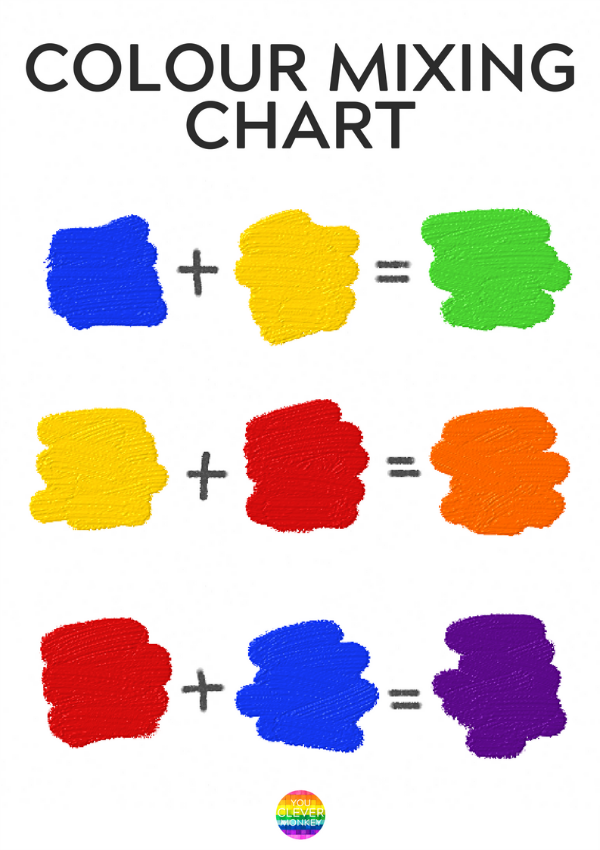10 fun hands-on ways to mix colours for young children to try at school or home to learn how new colours are made.
Learning how new colours are made from others is one of the first sciences young children will experience in early childhood.
Watching that moment of awe on a young child's face as two colours mix to create a brand new colour never gets old.
And creating such invitations to explore and make new colours can easily be done in class or at home.
We've collected 10 of our favourite but simple ways to mix colours for you to try.
This post contains affiliate links.
1. COLOUR MIXING WITH PAPER
This invitation requires only a few things to get you started creating secondary colours from just the three primary colours of red, blue and yellow.
You can see the full set of instructions here.
This activity is perfect for mixed ages of children and is simple enough to be from preschool and up.
2. COLOURFUL SALT PAINTING
Salt painting would have to be one of my all time favourite process art activities!
It's a simple multi-step process which is ideal for preschool aged children. It can be a free form exploration or a more precise creation like the one created by my 10 yr old at home.
First, you can create a picture using a strong, white PVA-glue.
Then, sprinkle some salt over all of the glue making sure it is completely covered. Shake off any excess salt carefully.
Using a small, soft paintbrush and three primary coloured watercolours, lightly touch the brush with your paint to the salt line. Your children will be amazed to see the colour move quickly along the line of salt.
You can see more of our salt painting window art here.
3. DIY LIQUID WATER COLOURS
We love using liquid water colours!
You can easily make your own too by simply recycling old dried markers.
By adding two different coloured markers to the same container, you can mix colours without any mess.
You can use any container to do this. We like to put ours into spray bottles to use for painting outside. Ideal for building up fine motor strength too! You can see how our spray paint art turned out here.
4. CREATE YOUR OWN SELF SERVE PAINT STATION
How genius is this idea! Use empty hand soap dispensers for paint.
Being smaller, children can help themselves to paint without getting too much from each squirt. It also means no more paint brushes put back in the wrong paint at your easels as children can create their own palette from old egg cartons or plastic lids.
You can print out these colour mixing labels for FREE. Look for the link at the end of this post!
5. MIX TO MATCH NATURE
Working in Early Childhood, we all know how much children love to mix paint.
Drawing inspiration from nature, this activity invited children to create their own shades of green to match plants found in the preschool yard. They also used the paint chips to match to the plants as well.
So simple to set up but was very popular and kept many children engaged until they had filled their palettes with different shades.
6. WALKING WATER EXPERIMENT
This colour mixing experiment is such a fun one to try in the classroom or at home.
Simple to set up - six glass cups the same size, water, paper towel and food colouring (red/blue/yellow) or liquid water colour paint.
You can find the instructions and scientific reasons why the 'water walks' over at The STEM Laboratory.
7. RAINBOW MILK EXPERIMENT
Rainbow Milk is another fun colour mixing science experiment your children will love! Mine certainly do!
Just watch this video from Steve Spangler.
8. COLOUR MIXING IN A BAG
Not every child likes getting their hands dirty but they don't have to miss out on all the fun! Simply add two or more paints to a large ziplock bag for them to explore.
Messy Little Monsters has created a rainbow in theirs. I like to put mine up on a window for some colourful handwriting practice in class as the colours look amazing with light behind them.
9. SHAVING FOAM PAINT
Add some food colours to shaving cream to create some cheap and easy to mix paint for young children to explore.
The same can easily be done with DIY puffy paint. I use this foolproof recipe from Happy Hooligans to create our puffy paint.
10. DIP DYEING
This activity is a fun way to explore both shape and colour mixing.
Using just kitchen paper towel and food colours, you can create some amazing results. You can see just how easy this activity was to do here.
Download our Colour Mixing Charts for FREE to inspire your children!
*With Australian/UK and American English spellings
LIKE IT? PIN IT!















